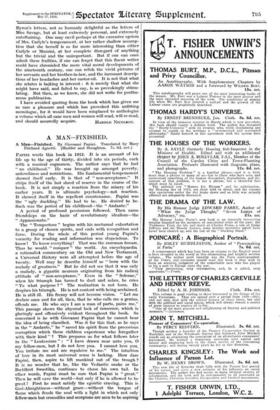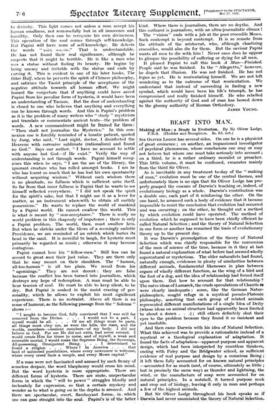A MAN—FINISHED.
A. Man—Finished. By Giovanni Papini. Translated by Mary Prichard Agnetti. (Hodder and Stoughton. 7s. 6d. net.)
PArau wrote this book in 1912. It is an account of his life up to the age of thirty, divided into six periods, each with a musical cognomen. The author says that he had " no childhood." He was brought up amongst poverty, unloveliness and restrictions. His fundamental temperament showed itself early. It is that of " non-acceptance." It strips itself of the last shred of reserve in the course of the book. It is not simply a reaction from the misery of his earlier years. It is ultimate psychology—not reaction. It showed itself in the repellent countenance. Papini was the " ugly duckling." He had to be. He desired to be. Such was the period of his childhood—the " Andante."
A period of profound pessimism followed. Then came friendships on the basis of revolutionary idealism—the " Appassionato."
The " Tempestoso " begins with his nocturnal exhortation to a group of chosen spirits, and ends with recognition and fame. During the whole of this period young Papini's voracity for reading and information was stupendous. To know ! To know everything! That was the summum bonum. Thus he would. " conquer " the world. An encyclopaedia, a rationalist commentary on the Old and New Testament, a Universal History were all attempted before the age of twenty. Well may he describe himself as " born with the malady of greatness." But he did not see that it was only a malady, a gigantic neurosis originating from his radical attitude of " non-acceptance." Even in the " Solenne," when his triumph has turned to dust and ashes, he cries " To what purpose ? " The realization is not born. He despises his triumph. He is not content with being acclaimed. He is still ill. His frenzy will not become vision. " Let me declare once and for all, then, that he who calls me a genius, offends me. He who says I am a man of parts, pains me." This passage shows the abysmal lack of innocence, which is glaringly and offensively evident throughout the book. So concerned is he with Giovanni Papini that he cannot bear the idea of being classified. Was it for this that, as he says in the " Andante," he " saved his spirit from the precocious corruption which those children experience who foregather with their kind " ? This prepares us for what follows later in the " Lentessimo " : " I have drawn near unto you, 0 my fellow-men, but I do not love you. I cannot love you. You irritate me and are repulsive to me." The intuition of love in its most universal sense is lacking. How dare Papini, then, aspire to lift mankind out of the trough ? It is no wonder that he, like the Vedantic snake or the Buddhist Swastika, continues to chase his own tail. In other words, Papini must be sure that Papini is " great." Then he will save the world—but only if he is allowed to be great First he must satisfy the egoistic craving. This is God-Almightiness—without grace—without the tongue of flame which floods the soul with a light in which not only fellow-men but crocodiles and scorpions are seen to be aspiring
to divinity. This light comes not unless a man accept his human smallness, not remorsefully but in all innocence and humility. Only then can he recognize his own divineness. This operation of the soul comes through self-knowledge. But Papini will have none of self-knowledge.. He detests
the words " 'path trECLIToV." That is understandable. lie has not found their real significance, although he suspects that it might be terrible. - He is like a man who sees a statue without feeling its beauty:- He begins- by being uneasy and irritable with the statue and ends by
cursing it. This is evident in one of his later books, The Other Half, where he perverts the spirit of Chinese philosophy, and satirizes the Taoist principle of the acceptance of the negative attitude towards all human effort. We might hazard the conjecture that if anything could have saved Papini from his peculiar form of hysteria, it would have been an understanding of Taoism. But the door of understanding is closed to one who believes that anything and everything can be known through words. And this is Papini's problem as it is the problem of many writers who " study " mysticism
and translate or commentate ancient texts—the problem of words. A new commandment might be framed for them : " Thou shalt not journalize the Mysteries." In this con-
nexion one is forcibly reminded of a lunatic patient, quoted by Jung, who said, " Last night, doctor, I disinfected the Heavens with corrosive sublimate (rationalism) and found no God." Says our author, I have no account to settle with anyone but God—if He exist." Verily the way of understanding is not through words. Papini himself recog- nizes this when he says, " I am the ass of the library, the ignorant creature who has rolled amongst books. I am he who has learnt so much that he has lost his own spontaneity without acquiring wisdom." Without such wisdom there is no plenitude, no fullness which is sufficient unto itself. So far from that inner fullness is Papini that he wants to see himself reflected everywhere. " I did not speak the spirit for the spirit's sake, but that I might use it as a lever for matter, as an instrument wherewith to obtain all earthly possessions." He wants to replace the world of mankind by a Papini world. He cannot swallow this world. This is what is meant by " non-acceptance." There is really no world problem in this rhapsody of impotence ; there is only a Papini problem. The world, then, must swallow him. But when he shrieks under the blows of a seemingly sadistic Providence, we are reminded of an ostrich which buries its head in the sand. It is merciful to laugh, for hysteria must primarily be regarded as comic ; otherwise it may become contagious.
Papini cannot love his " fellow-men." Still less can he accord to great men their just value. They are there only that he may mount on their shoulders. The " human, all-too-human " is all too plain. We recoil from his " agonizings." They are not decent : they are false because the conflict has been turned into journalism, which destroys any hope of redemption. A man must be able to bear tension of soul. He must be able to keep silent, to be
dry. But Papini is soaked in the moist craving of per- sonality, which he allows to exploit his most significant experience. There is no restraint. Above all there is no sense of humour, as the following passage from the " Solenne " shows :- " I sought to become God, fully convinced that I was still far removed from the Divine. . . . I would not be a part. I myself would be all. . . . - Of me all things must be parts, all things must obey me, as were the hills, the stars, and the worlds, members—obedient members—of my body. I did not believe in God. For me He did not exist, had never existed. I would create Him for times to come, and of myself, a weak and miserable mortal, I would make the Supreme Being, the Sovereign, All-possessing, Omnipotent Being. . . . I determined to found a religion . . . Where ? In America . . . that land of unlimited possibilities, where every newcomer is welcome, where every creed finds a temple, and every Moses capital."
•
If a man were not fascinated and amused by such frenzy of
senseless despair, the word blasphemy would cross his mind. But the word hysteria is more appropriate. There are different forms of hysteria. There are mute, unspectacular forms in which the " will to power " struggles blindly and inchoately for expression, so that a certain mystery and wonder as to what is going on in the depths is aroused. And there are spectacular, overt, flamboyant forms,- in which one can gaze straight into the soul. Papini's is of-the latter
kind. Where there is journalism, there are no depths. And this outburst is journalism, with an ultra-journalistic climax The "vision" ends with a jab at the poor crocodile Moses. Such contempt is beyond contempt. It is so remote from the attitude of the aristocrat, who, although chastizing crocodiles, would also die for them. But the saviour Papini wants all men to die with him ! Never once does he appear to glimpse the possibility of suffering or dying for all men.
It pleased Papini to call this book A Man—Finished. People said he was finished. In the " Allegretto," however, he dispels that illusion. He was not finished. He has not begun as yet. He is reorientating himself. We are not left wondering as to the outcome of that reorientation. We understand that instead of succeeding in finding a new symbol, which would have been his life's triumph, he has compromised and really finished himself. He who rebelled against the authority of God and of man has bowed down to the gloomy authority of Roman Orthodoxy.
JAMES Youxu.



















































 Previous page
Previous page